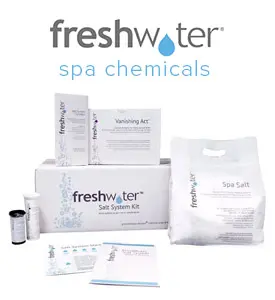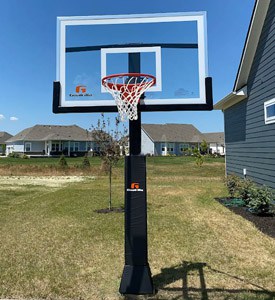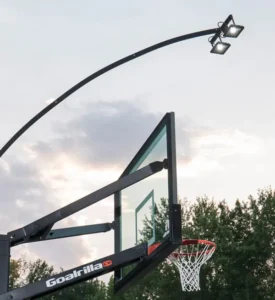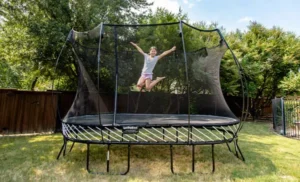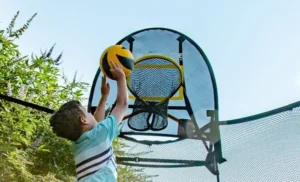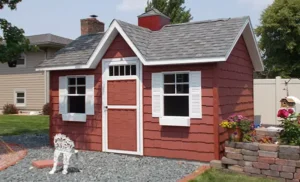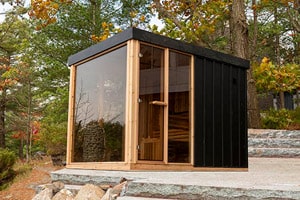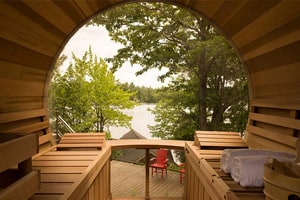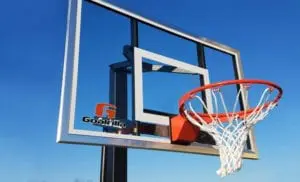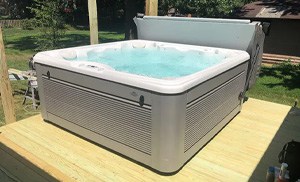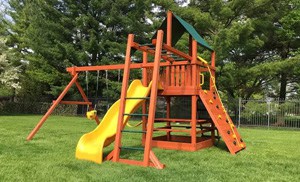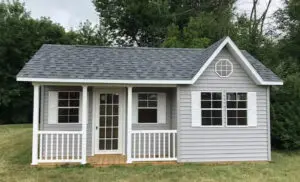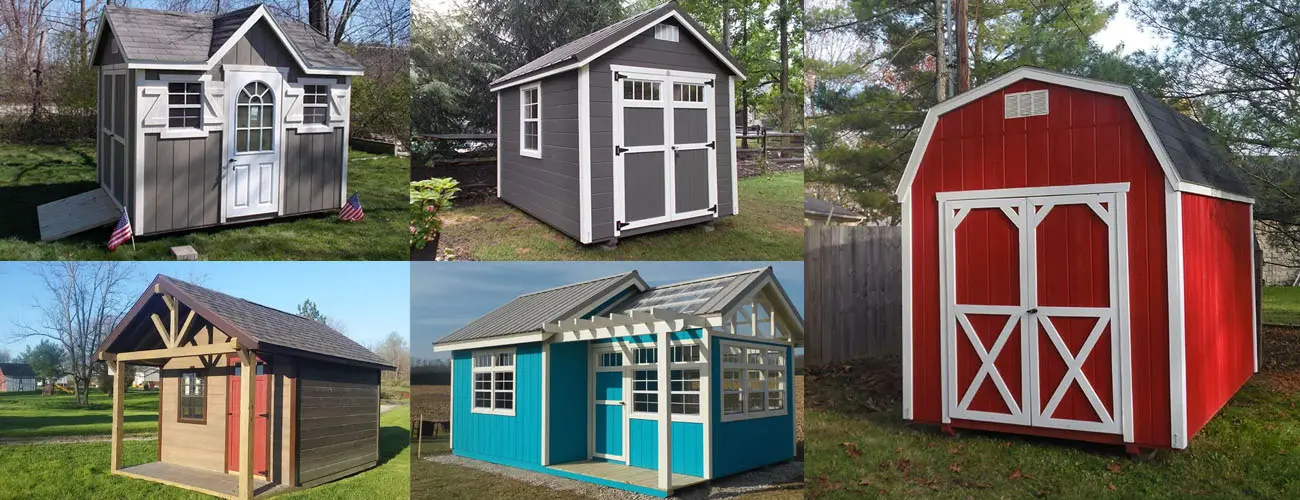
How to Prepare for Your Shed
Purchasing a new shed is an exciting occasion. You’ve spent time carefully choosing everything from the style, size, and exterior colors, down to the interior details and accessories. As your shed delivery date draws near, it’s time to make sure your shed site prep checklist is complete. We’ve compiled a list of helpful tips and considerations to assist you as you prepare for your new shed.
Do I need a building permit?
Whether a permit is needed or not depends on the size of the building and the location where the shed will be placed. Although most buildings under 120 square feet do not require a building permit, the only way to know for sure is to contact your City or Township to learn if there are regulations that apply to portable structures in your area. A site plan or building permit may be required.
If you live in a community with covenants on what type or style of building you can have, be sure to find out what you need to do to comply. We can do custom siding and shingles to match your house if that is a requirement. It is your responsibility to obtain any required permits and comply with your local regulations.
Where should I place my building?
It is very important that you have a level site. It should be free from low-hanging branches. You should avoid an area that is very wet or suffers from poor drainage. If you have an in-ground sprinkler system, the heads should be moved or diverted so no water is spraying directly on your building. Last but not least, be sure your building’s location can be accessed by the delivery crew.
If you are not sure if the site can be accessed for a pre-built shed then please let us know so a site inspection by our staff can be scheduled. If your site cannot be accessed, you will have a choice of clearing a path 2’ wider than the shed including roof overhangs or having your shed built on site for an additional fee.
Does the shed sit on anything, or is it placed directly on the ground?
Laying a proper shed foundation for your new outbuilding is the best way to ensure its longevity. Although placing a shed on the ground seems like an easy solution, there are a few reasons why this is inadvisable.
When lumber comes into contact with the elements, its lifespan is shortened. Most yards will get fairly saturated, particularly after a good rain, and if your shed is placed directly on the ground, all that moisture will seep through the soil and soak the bottom of your shed. This can cause the wood of the shed to rot and deteriorate. By raising the runners of the building off the ground and away from moisture, your building will last much longer. Additionally, without a foundation, your shed may end up leaning over time and can become unsafe.
Some of our customers choose to place the building on patio pavers, while others may choose to create a crushed gravel base or concrete slab as part of the shed site prep process. You can read more about these options below.
You must have a level, prepared site – Yes, it’s that important! If your site is more than 6” from being level there will be an additional charge to level. If you take a little extra time upfront to level your site when preparing the ground for your shed, you can relax and eliminate most problems with your shed.
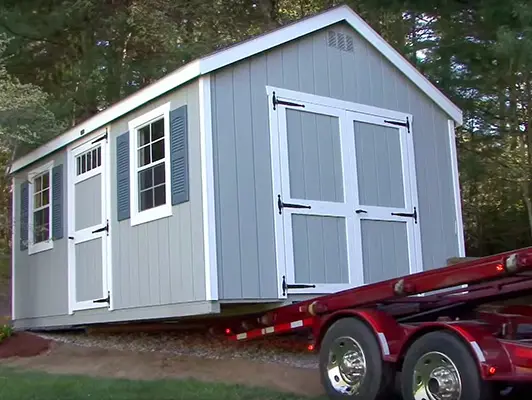
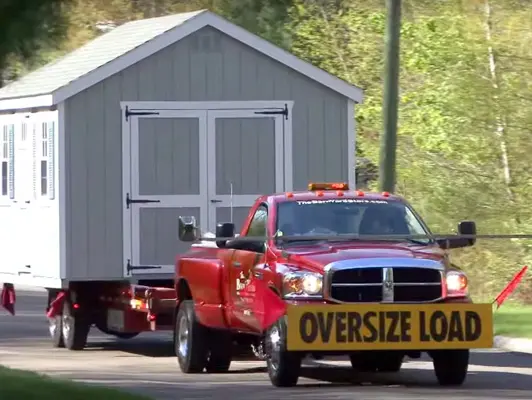
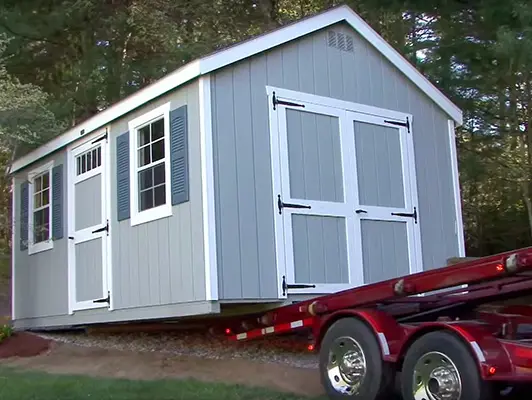
Suitable Shed Foundations
How to Prepare the Ground for a Shed
Laying a proper shed foundation for your new outbuilding is the best way to ensure its longevity. You’ve spent time choosing just the right style, colors, and features for your shed, so it only makes sense to protect your investment by laying a solid foundation.
By taking the time to prep the site for your new shed and lay a proper foundation, you can ensure it will last for many years. Take a look at our recommendations for suitable materials to place under your shed.
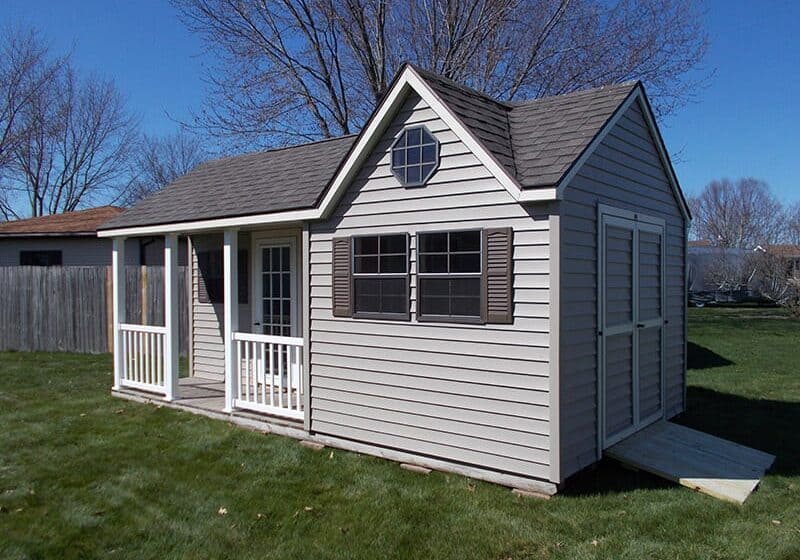
Paver Stones
If your site is already very level, your soil is firm, and drainage is not an issue, we can place your shed on paver stones. Paver stones are the most popular choice for shed foundations since they are so easy and effective. They raise your shed’s runners up off the soil to help prevent rotting of the wood over time, while still providing a way to accommodate minor slopes or leveling dilemmas from an uneven yard. Plus, paver stones are very accessible and can be purchased at most hardware or home improvement stores and are relatively inexpensive.
Please note: As the homeowner, you are responsible for having 20 pavers at the delivery site before the delivery date. 8” x 12” stones that are 2” thick are recommended.
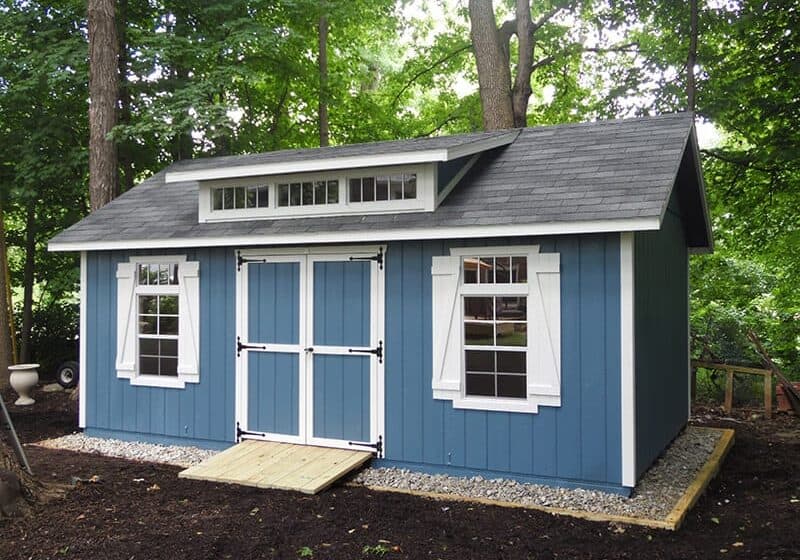
Crushed Stone
Crushed stone is one of the best ways to prepare your site. We recommend that you first remove the sod, then level out a crushed stone base, 4”-6″ deep. Be sure to use “crushed” stone that packs well as opposed to “pea” stone. #53 or standard driveway stone with lime dust works best and is relatively inexpensive. Extend the size of your base a minimum of 2′ longer and 2′ wider than the actual size of your building. Use a 6′ level on a long board or 2×4. Sight down the 2×4 to make sure it’s not bowed or crowned too badly. Check your site front to back, side to side, and diagonally. If you have access to a laser level or transit your job just got easier!
It is best, but not essential for the stone to be compacted. A walk-behind compactor available at most tool-rental companies works perfectly. You can also drive over the stone with your garden tractor to compact it as well.
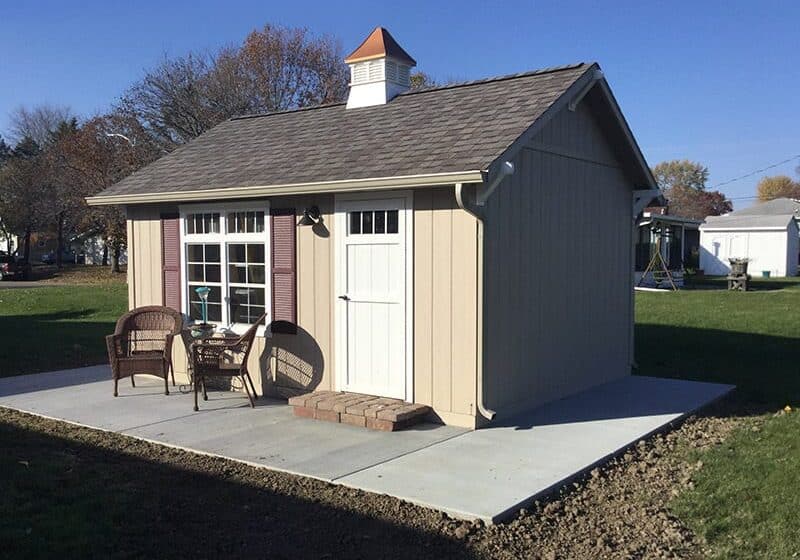
Concrete Slab
Concrete slabs are the strongest, most durable type of foundations for your shed. The biggest benefit to a concrete pad is that your shed won’t shift or settle. This is something to consider if you are planning on building a rather large shed or one that will be storing extra heavy equipment like tractors.
Plus, concrete is completely waterproof which is important if you are placing your shed in an area where the soil is prone to moisture.
Shed Delivery Options
Pre-Built and Ready to Go
Building is delivered fully-assembled
Pre-Built Delivery is recommended in most cases. Your building is manufactured in a quality-controlled, level shop environment and delivered to you ready to use. We can deliver any of our buildings up to 14’x36′ fully assembled. You must have a level, prepared site (hence the reason shed site prep is key!).
We know you value your lawn and landscaping and we will do our best to take good care of them. You should turn off your sprinkler system several days in advance of delivery to firm up your lawn. Mark the sprinkler heads so we can avoid them. Be aware that yard ruts may occur during normal delivery, especially if your lawn is wet. Fencing or shrubs that may be in the way should be removed prior to delivery. If you have a fenced yard we can possibly remove & replace a fence post and panel to gain access your yard for an additional fee.
If you have concerns about your site or the shed site prep process, sharing photos with us is very helpful. We can also sometimes do a site evaluation in advance. Our skilled drivers deliver your building exactly where you want it with the most advanced building transport systems available. We can use a mule for precise building placement with minimal damage to your yard.
Built on Site
Our crew assembles on site
Occasionally, On-Site Assembly is necessary if there is not enough room to get a pre-built building to your site. Our crew will bring the building out in pre-fab sections for quick assembly. All parts are small enough to go through a gate. Actual construction time on your property is usually only a day. We will need to know how far from the street we’ll have to haul the materials and you will need to provide access to electrical power outlet the day of the shed build. Shed site prep is still important if your shed is built on site.
Shed FAQs
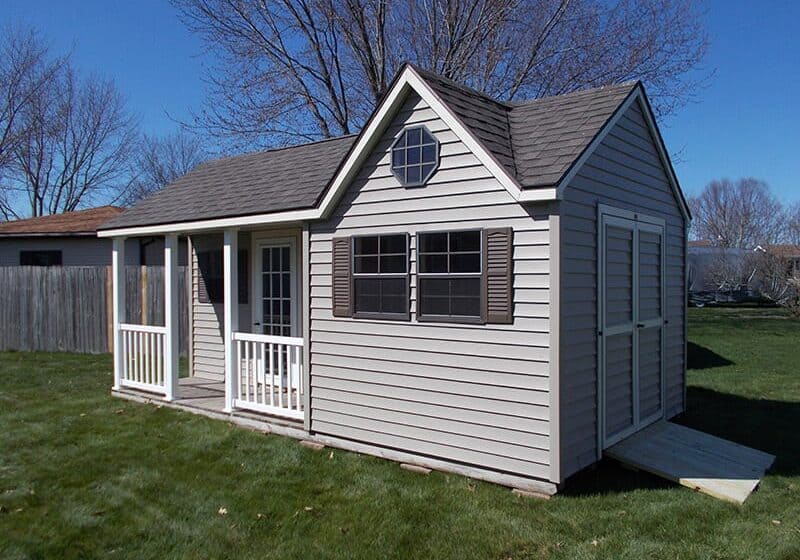
Warranty
Seven Year Limited Warranty
A seven year warranty is provided on all storage sheds, playhouses, and cabins. Recreation Unlimited uses trained craftsmen and materials selected only for a quality to produce the industry’s finest utility buildings. Should a problem arise, we will replace or repair the defective item. This warranty covers all materials and labor. An additional 5 year warranty is available for an additional fee. It is the customer’s responsibility to keep vegetation away from the perimeter of the building to allow free flow of air. No skirting or other obstruction should be used which might obstruct the circulation. Customer also agrees to apply final coat of finish within 90 days after the delivery or construction is complete on all primed or unpainted structures. Recreation Unlimited cannot assume responsibility for acts of nature (such as extreme wind, lightning, etc.) or abuse through neglect, or vandalism.
Cancellation Policy
All sheds are custom ordered. Once you place the final order it cannot be cancelled or altered. Please contact us if you have any questions.



